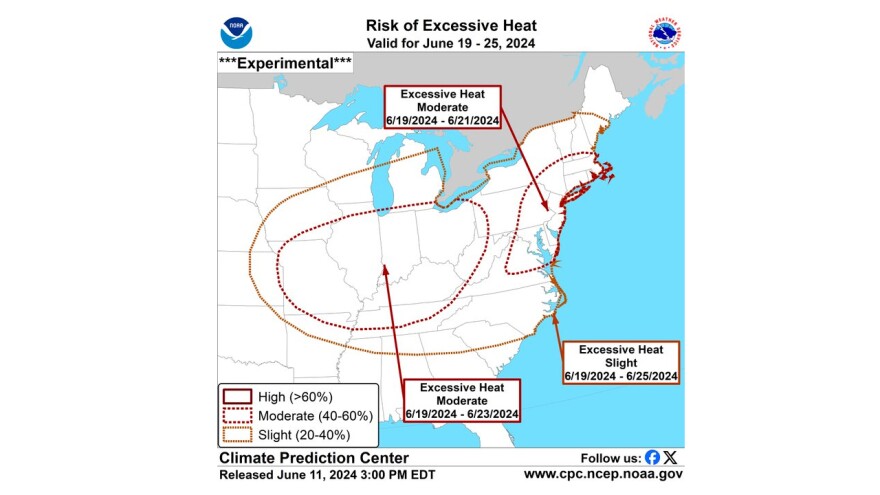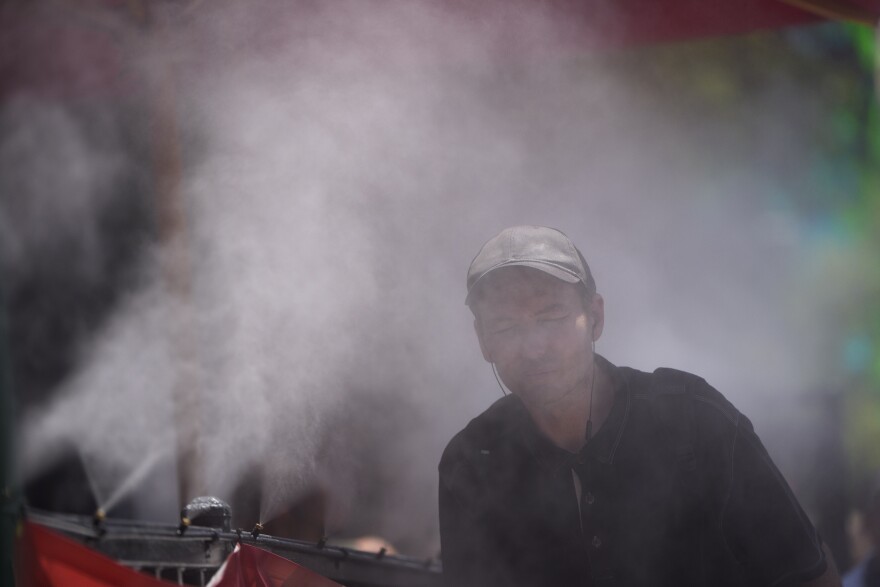BETHLEHEM, Pa. — Hot, summertime weather is anticipated in the Lehigh Valley and throughout the region in a stretch beginning next week — the area's first heat wave of the year, the Climate Prediction Center projects.
“A moderate risk of excessive heat (40-60% chance) is anticipated for metropolitan areas of the Northeast June 17-21 and parts of the Midwest June 19-23, with a slight risk (20-40%) for much of the eastern U.S. June 19-25," the CPC said on X. "Daily record highs are possible for several locations."
Heat index outlooks — projecting what it feels like outside with the heat and humidity combined — push feels-like temperatures near triple digits between June 17-21 and top 100 degrees in the Lehigh Valley between June 19-25.

There's still time to prepare for the swelter expected to settle upon us.
So here are some things about heat you should know, and ways to make your way through it.
What to know:
- The heat is expected to arrive before the official start of summer — the summer solstice — on June 20. Highs by Monday are expected to hit 90 and last through the week.
- The National Weather Service defines a heat wave as a stretch of abnormally hot weather generally lasting more than two days. In the Mid-Atlantic and Northeast, the 90-degree mark is the unofficial threshold for most areas.
- The NWS Mount Holly forecast office issues an excessive heat advisory when heat indices are expected to reach at least 100 degrees, except at least 105 degrees over Delmarva and far southern New Jersey (Salem, Cumberland, Cape May, and Atlantic counties). Those heat index values must be reached for at least two hours; typically a single-day event.
- An excessive heat warning is issued when heat indices are expected to reach at least 105 degrees, except at least 110 degrees over Delmarva and far southern New Jersey (Salem, Cumberland, Cape May, and Atlantic counties). Those heat index values must be reached for at least two hours per day; typically for a multi-day event.
- The CPC says model solutions “are in good agreement and consistent,” with above-normal temperatures favored for nearly all of the Lower 48 states in a period from June 18-24. The largest probabilities (above 70%) are forecast for the Midwest and Mid-Atlantic.
'Not prepared enough'
When extreme heat becomes a problem, major metro areas such as Philadelphia declare city-designated heat emergencies and deploy a number of special programs, including cooling centers and cooling buses.
The declarations recognize that certain populations, such as older residents, are at risk because they are more likely to have underlying health conditions and be socially isolated or limited in mobility.
“It's not something that's going to happen in the future — it's something that's happening now. And if we don't act, we're gonna have loss of life. And we could have prevented it if we had just been better prepared.”Chrysan Cronin, director and associate professor at Muhlenberg College’s public health program
The declaration also moves to protect workers in certain sectors of the economy exposed to heat risks, including construction, utilities, transportation and more.
But in the Lehigh Valley, there are no official designated cooling centers or cooling stations — places where people are encouraged to go to cool down, often in air conditioning.
Such centers could be run by a government or just be places open to the public, such as a library or mall.
Chrysan Cronin, director and associate professor at Muhlenberg College’s public health program, told LehighValleyNews.com last summer the area is “not prepared enough” for extreme heat as climate change progresses.
“It's not something that's going to happen in the future — it's something that's happening now," Cronin said.
"And if we don't act, we're gonna have loss of life. And we could have prevented it if we had just been better prepared.”
How and where to stay cool
To keep people cool during excessive heat, public officials have often pinpointed places to get out of the sun, including air-conditioned spots such as libraries and indoor malls.
In the past, Lehigh Valley Active Life has partnered with Lehigh County to be an emergency cooling center for seniors.
There also are plenty of pools and spray parks across the Lehigh Valley, along with interactive pop jet water fountains at Town Square at Promenade Saucon Valley.
See the map below:
During excessive heat conditions, Allentown also has increased pool accessibility for residents, and the fire department typically sets up cooling stations at various locations.
“We are still in the process of determining when and where we will be providing these services," Allentown Fire Chief Efrain Agosto said.
"But for the most part, the decision for cooling stations is always going to be dependent on the declaration of excessive heat.”
Allentown has a summer playground program coming up, Agosto said, and the fire department also will spray kids at these events.
Meanwhile, if you're looking for places to refill a water bottle, check out the website Tap, a search engine that allows you to find the closest free water refill station to your location.
Recognizing signs of heat illness
The U.S. Centers for Disease Control and Prevention says outdoor workers should gradually increase their exposure time in hot conditions over a seven-to-14-day period, and that new workers will need more time to acclimatize than workers who already have had exposure.
With this being the Lehigh Valley’s first anticipated heat wave, it will be even difficult to adjust based on the time of year.
That’s why it’s important to recognize the signs and symptoms of heat-related illness, including cramps, heat exhaustion and heat stroke.
Symptoms of heat exhaustion include:
- Headache
- Nausea
- Dizziness
- Weakness
- Irritability
- Thirst
- Heavy sweating
- Elevated body temperature
- Decreased urine output
Heat stroke is the most serious heat-related illness and occurs when the body can no longer regulate its temperature.
Symptoms of heat stroke include:
- Confusion, altered mental status, slurred speech
- Loss of consciousness (coma)
- Hot, dry skin or profuse sweating
- Seizures
- Very high body temperature
- Can be fatal if treatment is delayed
Heat Related Illness by LehighValley Newsdotcom on Scribd
At the end of its forecast discussion Wednesday, the weather service looked to the week ahead by saying, "[The] main story of the long term will be the heat. It remains too early to discuss any potential heat headlines at this time, but rest assured, it will feel hot."


